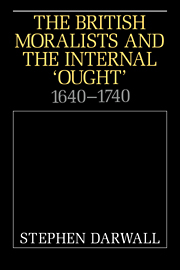Book contents
- Frontmatter
- Contents
- Acknowledgments
- List of abbreviations
- The British moralists and the internal ‘ought’: 1640–1740
- 1 The British moralists: inventing internalism
- 2 Culverwell and Locke: classical and modern natural law
- 3 Hobbes: ethics as “consequences from the passions of men”
- 4 Cumberland: obligation naturalized
- 5 Cudworth: obligation and self-determining moral agency
- 6 Locke: autonomy and obligation in the revised Essay
- 7 Shaftesbury: authority and authorship
- 8 Hutcheson: moral sentiment and calm desire
- 9 Butler: conscience as self-authorizing
- 10 Hume: norms and the obligation to be just
- 11 Concluding reflections
- Works cited
- Index
2 - Culverwell and Locke: classical and modern natural law
Published online by Cambridge University Press: 02 December 2009
- Frontmatter
- Contents
- Acknowledgments
- List of abbreviations
- The British moralists and the internal ‘ought’: 1640–1740
- 1 The British moralists: inventing internalism
- 2 Culverwell and Locke: classical and modern natural law
- 3 Hobbes: ethics as “consequences from the passions of men”
- 4 Cumberland: obligation naturalized
- 5 Cudworth: obligation and self-determining moral agency
- 6 Locke: autonomy and obligation in the revised Essay
- 7 Shaftesbury: authority and authorship
- 8 Hutcheson: moral sentiment and calm desire
- 9 Butler: conscience as self-authorizing
- 10 Hume: norms and the obligation to be just
- 11 Concluding reflections
- Works cited
- Index
Summary
An excellent way to begin to appreciate the profound changes that philosophical thinking about obligation was undergoing in seventeenth-century Britain is to juxtapose Nathaniel Culverwell and John Locke. Here are two thinkers whose views are superficially very similar, at least when we compare Culverwell to the Locke of Essays on the Law of Nature. Indeed, it has been argued that Culverwell's Discourse of the Light of Nature is an important source of Locke's main doctrines in the Essays. But though similar on the surface, their views have utterly different philosophical underpinnings. Whereas Culverwell writes still within the classical tradition of natural law, Locke is a modern. He rejects the natural teleology necessary both to ensure a coincidence between duty and interest and to give classical natural law its normativity. And so he has to confront the modern problematic of moral obligation.
Beginning with this comparison requires us to proceed out of chronological order. Hobbes is the earliest (and, in many ways, most radically original) of the writers we shall be considering, whereas Culverwell's Discourse of the Light of Nature was published in 1652, one year after the appearance of Hobbes's Leviathan and ten years after the first Latin edition of De Give. But Culverwell's Discourse was largely unaffected by the main seventeenth-century philosophical currents – in particular, by the powerfully influential Hobbesian project of an empirical-naturalist ethics without final causes, drawing “consequences from the passions of men.” Culverwell's main source of inspiration was Suarez, not Hobbes, Selden, or even Grotius, although he frequently referred to him.
- Type
- Chapter
- Information
- The British Moralists and the Internal 'Ought'1640–1740, pp. 23 - 52Publisher: Cambridge University PressPrint publication year: 1995



